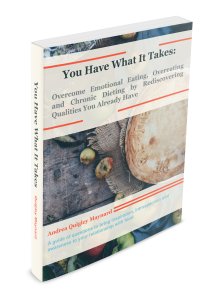
Food is never going to fill you up. What will then? That’s for you to figure out. family? travel? volunteering ? cooking? playing music?
The different feelings we have in our body aren’t arbitrary and don’t come from nowhere, and that includes all of the kinds of hunger we experience.
No hunger, whether it be emotional hunger or true physical hunger, comes along without a valid reason. You’re not physically hungry because you’re lazy, or don’t have enough willpower. You’re hungry because it’s time to eat!
You’re not emotionally hungry because you’re pathetic. You’re emotionally hungry because something is missing or not being tended to.
We need to feed both kinds of hunger, but to satisfy each type, we need to know exactly what to feed ourselves with.
Physical hunger is easy (despite how determined our society is to make it complicated). When we eat food in an appropriate quantity for our body, physical hunger goes away. When we eat enough, we are comfortable for a few hours at a time, sometimes many hours. Physical hunger comes back when we’ve digested our last meal and our body begins to let us know with tummy grumbles and other signals that it is time to eat food again.
One way to know if you’re experiencing physical hunger is that many different types of food will be appealing to you. You would be willing to eat a burger, but you’d also be willing to eat pizza, a stir fry or a salad if that is what was available. This doesn’t mean that some things aren’t more appealing than others, but if you only had one food option (barring any health conditions that require avoidance of a specific food) and were physically hungry, you would shut up and chew!
Emotional hunger is different. If we try to feed emotional hunger with food (and often many of us do), we will still ache, we still feel “hungry” (despite possibly being physically full). Hungry. Restless. Bored. Irritated. Confused. Angry. Apathetic. We will feel something that we can’t quite put our finger on. We will keep feeling a gnawing desire for something. We might go to the pantry or look in the fridge a dozen times, only to sit back down because we don’t know what we want or we only want one thing in particular.
One clue that you are experiencing emotional hunger is that you would actually choose to forgo eating if you can’t get your hands on whatever you’ve decided you wanted. Emotional hunger is sometimes picky. We may not know exactly what we want but we know we don’t want x, y and z.
Just like pain is our body’s way of alerting us that something is physically wrong, emotional hunger is a sign from our brains and hearts that what we are doing isn’t working. It’s one of our many alert systems and it won’t stop unless we address it.
There is no amount of physical food in the world that we can consume that will take care of an emotional need. With emotional hunger, you have to look inside a bit to discover what it might be satisfied by.
If you want to satisfy Emotional Hunger properly, here’s what you need to do:
Ask yourself:
- Where might you not be listening to your own needs?
- What message could your body be trying to convey that you are not hearing?
- Where are you not being honest with yourself?
- What’s missing from your life right now?
- What are you craving more than anything?
- Do you have outlets for creativity? Spirituality? Physical activity? Love/affection?
- Do you regularly experience meaning, purpose or value in your life? If not, what experiences give you (personally) those things? How can your get more of them?
To soothe emotional hunger, we have to:
- Figure out what it is we are missing or craving (love, companionship, creativity, spirituality, meaning, etc).
- Be willing to feel the discomfort once we’ve identified it (just let it be there). Recognize that you’ll survive – feeling it won’t kill us and running away from the feeling isn’t going to “fix” it.
- Construct a plan to get that need met. Feed yourself emotionally in a way that will actually satisfy that hunger.
Figuring out what it is exactly we’re missing is sometimes the hardest part. If that’s you, be willing to try lots of different things. For some that part is easy, it’s just that they have a difficult time taking action on it. If that’s you, it sometimes helps to tell someone what it is you want to change and ask them to hold you accountable to taking action on it. Sometimes having someone check in with you is enough of a “fire” to motivate you to move forward.
A note about feeding Emotional Hunger with food
If you are dealing with emotional hunger, and you feed yourself physical food instead of emotional “food”, you’ll never feel satisfied. You’ll never feel full enough, you’ll always feel deprived and you’ll continue to reach for food when you feel the things you don’t want to feel – because those feelings come back afterwards (often stronger).
Emotional eaters frequently eat to distract ourselves from feeling a certain way, believing that the feelings we are feeling are too awful to confront. To avoid feeling crappy, we overeat to make ourselves feel good or comforted, but the irony is that by doing this we end up feeling far WORSE than those bad feelings made us feel to begin with.
Read that again. The exact thing you are using for comfort is causing you more pain than whatever you are running from.
I did this for so long. Up and down cycles of eating and avoiding, eating too much food and avoiding my real feelings, feeding my true hungers. I conflated my discomfort with not knowing what it was that I wanted (emotional hunger) with physical hunger.
I royally screwed up my digestive system, felt physically ill much of the time from overeating, kept people at an arm’s distance and I stayed in situations that were stifling me emotionally and creatively. Why?? Because eating was so much easier than dealing with any of it. Eating felt like a solution, even if it was just for a short amount of time. It required less effort on my part, less confronting myself and my fears, less risk taking, less responsibility, less vulnerability. I could hide in my kitchen and build up a wall around me with a bag of chips.
Well anyone who has ever tried to build any type of fortress with food knows full well that it’s not lasting armor. It needs constant replenishment. Any “strength” garnered from the activity of eating is gone as soon as you swallow that last bite (sometimes before!!!).
Battling life this way makes it a war you can’t win, because in a war with yourself, the loser is always going to be you.
If you are tired of going through the motions, and ready to confront something that clearly isn’t working for you, you can change it. I’m not going to lie – it is work and it takes a sincere willingness to call yourself out on your own bullshit story (repeatedly!). It means not putting our heads in the sand, not running away from uncomfortable feelings. It means looking at and addressing the things in your life that aren’t providing the value, meaning and purpose you are after (and that is scary stuff, isn’t it?).
Learning how to differentiate and respond to both physical and emotional hunger appropriately is a game changer! It’s so very worth it. If you decide to start paying attention to your hungers, you will grow and you’ll change in ways that some won’t recognize you afterwards – but that’s okay, because in a way you’ve been hiding who you were this whole time!
As scary as it can be to try to understand and tackle the source of your emotional hunger, you’ll find that once you start getting underway with it that you have less anxiety, less irritation, less anger and less confusion. You’ll feel more secure and confident. And you’ll have less of the physical discomfort that comes from eating when we don’t really want food!
Don’t ignore the signs from your body (brain and heart) that something isn’t right. If you have a “hunger” that you can’t satisfy no matter what you eat (and something isn’t physically wrong health-wise), it’s not physical hunger and it’s time to explore where that emotional hunger is stemming from. And if you want help looking at that, let’s talk!
Hey I know it’s tough to change your relationship to food on your own. That’s why I created “You Have What it Takes“, a guide full of questions to help you improve your relationship to food using different qualities you already have. Download your copy at the link here.













